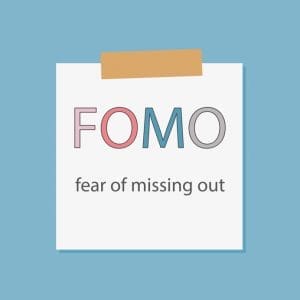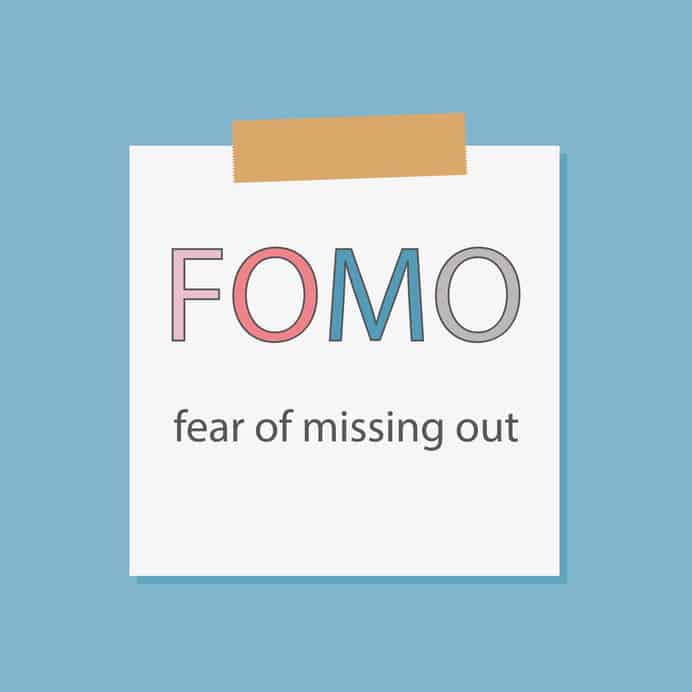Share This Article
Diving into FOMO-Fear of Missing Out
Imagine someone grappling with an extreme case of Fear of Missing Out (FOMO). This individual’s life is characterized by a constant, overwhelming fear of not being part of every exciting event, adventure, or opportunity that comes their way.
They are hyper-connected to social media, obsessively refreshing their feeds to stay updated on the latest happenings. Missing a single notification induces anxiety, and they are compelled to be present at every event, no matter how inconsequential. Sleep is sacrificed in the pursuit of staying connected.

Their calendar is an intricate web of commitments, with no room for spontaneity or rest. Declining an invitation feels impossible, as they dread the idea of missing out on something incredible. This chronic restlessness leaves them perpetually fatigued and stressed.
This person experiences a rollercoaster of emotions. When they do participate in an event, they may feel a momentary high, but it’s often followed by anxiety about the next opportunity they might miss. They struggle to be fully present, always thinking about the next big thing.
Their relationships can suffer as they’re physically present but mentally absent, constantly checking their devices. They may even experience resentment from friends and family who feel neglected.
Ultimately, someone with extreme FOMO lives in a cycle of anticipation, excitement, anxiety, and exhaustion. Breaking free from this cycle requires recognizing the need for balance, setting boundaries, and seeking support to manage their fear and regain a sense of control over their life.
What is FOMO
Fear of Missing Out (FOMO) is a pervasive and relatable modern phenomenon. It’s the gnawing apprehension that you’re missing out on exciting experiences, events, or opportunities that others are enjoying. FOMO is driven by our hyper-connected world, fueled by social media and constant information sharing.
When you have FOMO, you may find yourself compulsively checking your social media feeds, fearing that you’re not part of the latest happenings. It can lead to anxiety, restlessness, and even a sense of inadequacy. The fear often arises from comparing your life to the seemingly more exciting lives of others, which can be unrealistic due to the selective nature of what’s shared online.
FOMO can impact your decision-making, making you say “yes” to too many commitments and causing burnout. Understanding FOMO is the first step in managing it, allowing you to find a healthier balance between staying connected and taking care of your well-being.
Potential Causes of Developing FOMO
Fear of Missing Out (FOMO) is a common feeling in our hyper-connected world, and several factors can contribute to its development:
- Social Media Influence: The constant stream of idealized and curated experiences on platforms like Instagram and Facebook can trigger FOMO. Seeing friends and acquaintances seemingly living their best lives can make you fear missing out on exciting events or opportunities.
- Comparison Culture: In a society that values success and experiences, the fear of falling behind or not measuring up to others can intensify FOMO. Comparing your life to others’ highlights what you may perceive as shortcomings.
- Peer Pressure: Friends or colleagues sharing their plans or achievements can put pressure on you to keep up. The fear of disappointing others or not being included in their activities can lead to FOMO.
- News and Trends: Constant exposure to news, trends, and viral stories can make you feel like you’re missing out on important information or cultural moments if you’re not always plugged in.
- Personal Expectations: Setting high expectations for yourself or feeling a need to achieve certain milestones by a certain age can exacerbate FOMO. Not meeting your own goals may trigger fear of missing out on your own life plans.
- Isolation: Loneliness or isolation can intensify FOMO, as it may lead you to believe that everyone else is having more fun and fulfilling experiences than you.
- Insecurity: Low self-esteem or self-doubt can make you more susceptible to FOMO, as you may constantly seek external validation and fear missing out on opportunities to boost your self-worth.
It’s important to recognize that FOMO can be a complex emotional response influenced by various factors. Understanding these potential causes can be the first step in addressing and managing FOMO in a healthier way.

Symptoms of FOMO
Symptoms vary from one individual to another and depend on the severity of the phobia.
People with mild cases of FOMO may experience symptoms like shakiness and sweating, while those with extreme cases may experience panic attacks.
Physical Symptoms of FOMO
Here are some physical symptoms of FOMO (Fear of Missing Out) :
- Restlessness
- Racing heartbeat
- Sweating
- Shaking or trembling
- Muscle tension
- Upset stomach or nausea
- Headaches
- Difficulty sleeping
- Feeling on edge
- Shortness of breath
Psychological Symptoms of FOMO
Here are some psychological symptoms of FOMO (Fear of Missing Out):
- Anxiety or worry
- Irritability
- Constantly checking social media
- Feeling left out
- Envy of others’ experiences
- Low self-esteem
- Obsessive thoughts about what you’re missing
- Fear of not being “in the loop”
- Difficulty focusing on the present
- Fear of making the wrong choice
Possible Treatment Options for FOMO
Here are some ways to tackle FOMO (Fear of Missing Out):
- Digital Detox: Try taking breaks from social media and other digital platforms. Give your mind some chill time away from the constant updates and comparisons.
- Mindfulness Meditation: This isn’t about emptying your mind, it’s about being present. Take a deep breath, focus on the here and now, and let go of FOMO-induced stress.
- Set Boundaries: It’s okay to say “no” sometimes. Don’t overcommit to events or social gatherings. Prioritize what truly matters to you.
- Talk It Out: Share your feelings with friends or a trusted confidant. Sometimes, just talking about your FOMO can make it feel less overwhelming.
- Self-Care: Treat yourself kindly. Engage in hobbies, exercise, or anything that makes you feel good. Remember, you deserve some ‘me time’ too.
- FOMO Journaling: Write down your FOMO feelings and thoughts. Sometimes, putting them on paper can help you gain perspective and manage them better.
- Therapy: If FOMO is interfering significantly with your life, consider talking to a therapist. They can provide strategies and support to address your fears.
- Gratitude Practice: Count your blessings. Focus on what you have and the positive experiences in your life. It can help balance out FOMO-induced negativity.
- Set Realistic Expectations: Nobody can do it all. Understand that everyone’s life has its ups and downs, and what you see on social media isn’t the full picture.
- Build Real Connections: Instead of chasing quantity, focus on quality relationships. Meaningful connections can help alleviate the fear of missing out.
Remember, you’re not alone in dealing with FOMO, and there are friendly ways to tackle it. Just take it one step at a time, and don’t be too hard on yourself.
Lets Us Conclude
FOMO is a modern-day challenge that affects many in our digitally connected society. Understanding its causes and consequences empowers us to make mindful choices. By embracing moments of genuine connection, setting boundaries, and prioritizing our well-being, we can mitigate the grip of FOMO and lead more fulfilling lives.



